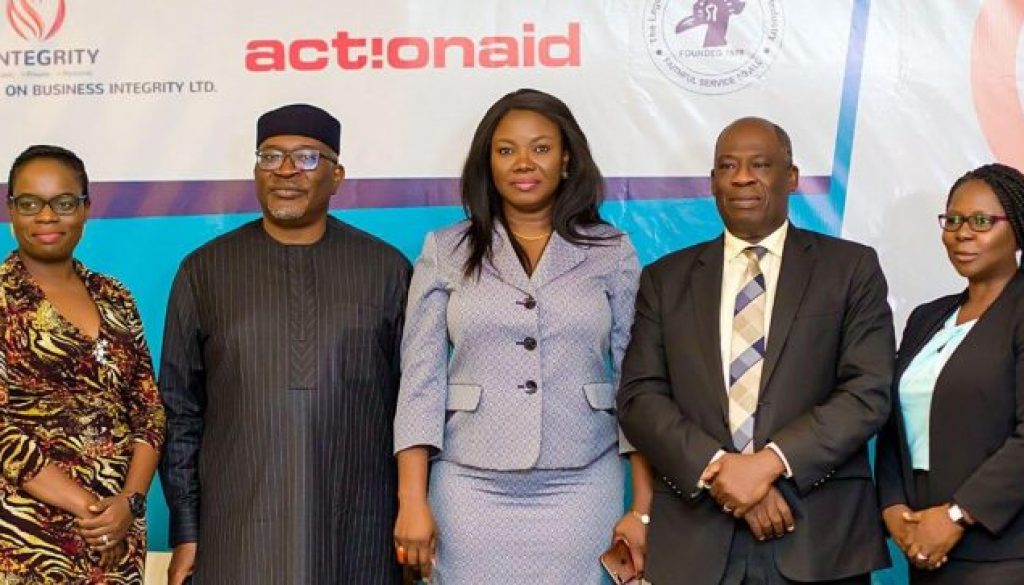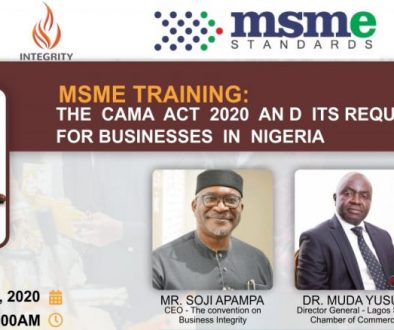CBI, Action Aid Nigeria & LCCI Collaborate To Strengthen Ethics and Governance For MSMEs In Nigeria

As part of its advocacy for deepening the capacity and scale of Micro Small and Medium Enterprises, MSMEs, in Nigeria the Convention on Business Integrity (CBi) in collaboration with Action Aid and the Lagos Chamber of Commerce and Industry (LCCI), hosted the formal unveiling of the “Ethics Quite Easily Demonstrated” platform in Lagos.
Addressing the audience in a keynote message, the CEO of CBi Nigeria, Mr. Soji Apampa, said the event was an opportunity to explore how MSMEs could improve their chances of growth and survival, despite the challenges they face in the country.
Speaking further, Mr. Apampa noted that in 2017, the International Finance Corporation (IFC) highlighted the need for MSMEs to adopt a compliance platform to enhance their business structures. According to him, 96% of Nigerian businesses are MSMEs, while some scholars have suggested that they contribute at least 1% to the GDP of the economy.
He listed the following as challenges facing MSMEs in Nigeria, which include;
- Access to Infrastructure
- Access to Finance
- Lack of Accountability
- Lack of access to the right advisory services
- Absence of effective governance structures
- Corruption
- Irregular Power Supply
- Unfavourable tax policy
- Policy inconsistency
Apampa stressed the fact that doubtful ethics will always lead to doubtful business practices and encouraged the MSMEs to forge strong collaborations and adopt the COSO 2013 framework, which has the international best practice for ethics and governance.
In her remarks the Director, Organizational Effectiveness Action Aid Nigeria Mrs Funmi Oyefusi, lauded the unveiling of the MSME web-based solution for ethical compliance. She noted that the portal was created with a mind to meeting international standards that would improve the operations of SMEs in the country, as they continue to contribute to the growth of the economy. Mrs. Oyefusi noted that Action Aid was established for social justice and poverty alleviation and will continue to support initiatives that support the development of MSMEs that contribute immensely to economic activities in the country.
The event featured a panel discourse with seasoned experts participating and giving their perspective on Ethics, Governance and MSME growth in Nigeria.
Dr Peter Bankole of the Enterprise Development Centre of the Pan-African University also listed the issues that have to be addressed for MSMEs to unlock their potentials in the country, which include; addressing the lack of access to markets, addressing the infrastructure issues, addressing the lack of access to finance, addressing the lack of access to information, creating an environment that provides support services to the MSMEs and addressing the lack of access to technology.
The Pan African University lecturer believed that an enabling infrastructure (roads, rail, power, broadband) was vital to the growth of MSMEs in the country. He observed that it was important for MSMEs to digitalize their businesses to create value in the age of the fourth industrial revolution.
Mrs. Ayodele Oloyede, Group Head, Emerging Businesses, Access Bank stressed the need for financial education for the MSMEs, to be able to access support services like financing. She emphasized the need for MSMEs to register their companies with the Corporate Affairs Commission (CAC). According to her, over 90% of MSMEs do not have their businesses registered.
“MSMEs are not able to scale and survive because of wide knowledge gaps,”
Mrs. Ayodele Oloyede, Group Head, Emerging Businesses, Access Bank
Ayodele stressed that basic regulatory compliance was necessary to get access to finance. She also urged the MSMEs to take the issues around the financial management of their operations seriously, to achieve scaled growth.
Mrs. Tosin Ojo of the SME.ng noted that there is a need for the MSMEs to be incentivised to comply with the ethics and standards that would enable them to become better organized and properly structured. The enterprise advocate noted that SMEs have the challenge of finding talent and retaining them. She acknowledged the fact that there has been a lot of capacity issues for SMEs, which need to be addressed and advised emerging businesses to deploy capital optimally.
Ojo tasked MSMEs to align with the right standards so that they can be in the best position to access finance for their businesses.
The Chairman of the National Association of Small Medium Enterprises, NASME Lagos, Mr. Solomon Aderoju, in his contribution at the panel session, called for increased support and motivation for the MSMEs in the country. Aderoju said there should be training and re-training of entrepreneurs, which is part of the activities of NASME that gives priority to capacity development. He called for an enabling environment for MSMEs in the country at the federal, state and local government levels as well as increased market access to drive businesses.
The NASME Chairman supported the call for MSMEs to drive ethics and professionalism in their businesses but made a strong case for more awareness on what the standards are. He also made a strong case for continuous advocacy to improve MSME growth across the country.
Mr. Kehinde Shogunle, former Commissioner of Finance, Ogun State, in his contribution at the event, tasked MSMEs to develop business models properly crafted, taking into account creativity and innovation.
Giving a brief overview of the Ethics QED platform, Mr. Maduka Okafor of CBi gave stakeholders an insight into the portal and its role, which covers; value proposition, customer segments, channels, customer relations, key resources, the key partners and key activities.
Apampa, CBi’s CEO, also gave insight into the COSO 2013 framework which is a global support tool on ethics and compliance for MSMEs covering the following areas;
- Control Environment
- Risk assessment
- Control activities
- Information and Communication



